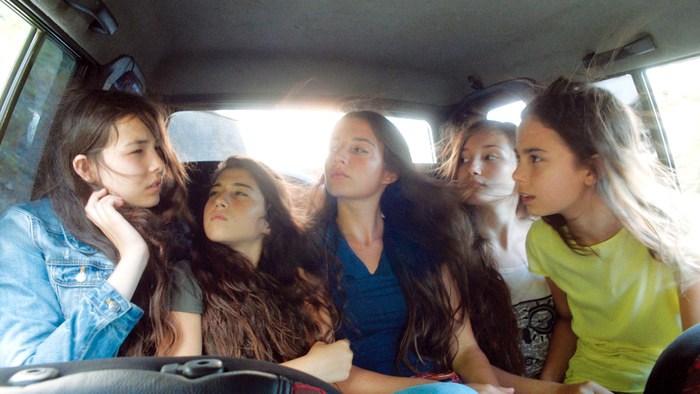Academy Award nominee for Best Foreign Film, Mustang begins with five sisters walking home on the last day of school. They bump into a few male classmates and play in the sea, a jubilant expression of playfulness and freedom in anticipation of a long, lazy summer ahead.
They stop to eat apples in an orchard (a really bad sign, biblically and symbolically), and when the sisters return they are greeted by beatings from their grandmother (Nihal G. Koldas), who has been shamed because a neighbour has seen the girls’ disgraceful “obscene” behaviour and spread news of it in the village. “Everything changed in the blink of an eye,” says Lale (Gunes Sensoy).
This is a coastal town in Turkey and time seems to have stood still (indeed, it could be present day, it could be several decades ago). Western viewers will be outraged at this violent outburst and by the treatment of the girls that follows. But while the culture may be alien, the themes of identity, coming-of-age angst, sexual awakening and the bond of sisterhood are universal.
Lale, the youngest, most rebellious and perhaps most sensible of the lot, chronicles what happens next. An uncle to the orphaned girls is consulted and the sisters — Sonay (Ilayda Akdogan), Selma (Tugba Sunguroglu), Ece (Elit Iscan) and Nur (Doga Doguslu) — are to be imprisoned in the house. Phones, computers and magazines are confiscated; the girls are measured for plain, sack-like clothes.
Perhaps most unfair to soccer-mad Lale is the fact that she can’t travel to the final soccer match with the men of the village.
The girls have distinct personalities but also move as one mass, a unified front against their strict culture and lousy circumstances. As a group, the energy these girls produce is a force of nature. Is it any wonder, then, that their elder relatives start to divide and conquer, marrying them off one by one and weakening their power?
Women of the village swoop in to provide cooking and housewifery lessons until the sisters are betrothed, one by one. “The house became a wife factory that we never got out of,” laments Lale, who looks desperately for a way out as her sisters face varying degrees of misery at the same fate. Â
So what if they are teens and even tweens: there are virginity checks on the girls, including one on a wedding night, with the groom’s suspicious family waiting in the hospital hallway. The girls are sold to the men’s families like cattle.
But they are not cattle, they are mustangs, all long brunette manes and coltish limbs, straining against the walls into which they are penned.
Dark family secrets are revealed, leading Lale to take extreme measures to escape the provincial and religious traditions of the family. The final heartbreak of the story is the certainty that any girls who do escape the house face as much potential violence and misery as the ones who do not. Â
Director and co-writer Deniz Gamze Erguven maintains this tension while employing a surprisingly light touch. Her actors — many of them first-timers — are natural talents, and moments of humour and acts of small rebellion help to temper the tragic plight of these girls.
Mustang screens May 17 and 19 at Vancity.



